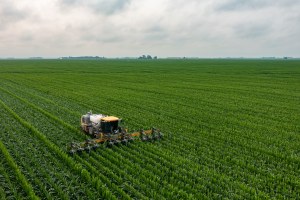The United States should increase support for agricultural R&D in the next Farm Bill to ensure farmers can keep feeding the world in spite of challenges from climate change and other shocks. In collaboration with the Farm Journal Foundation, the Council provides recommendations for US government action.
Hotter temperatures, droughts, floods, spreading pests and disease, and other natural disasters have reduced global agriculture productivity gains in recent years. Consumers are paying higher prices for food, while farm livelihoods are under pressure from rising costs of fuel, fertilizer, and other inputs. In addition, increasing hunger in low- to middle-income countries can potentially lead to more migration and conflict, creating risks for US national security.
New innovations generated from agricultural research at land-grant universities and other public sector institutions can help increase farm productivity and economic growth. In spite of this, US public investment in agricultural research and development (R&D) has declined in recent years in inflation-adjusted terms. The 2023 Farm Bill offers a once-every-five-year opportunity to increase funding to public agricultural R&D and ensure that the US is prepared for the challenges ahead.
Agricultural research provides one of the highest returns of any public research investment, generating $20 on average for every $1 spent, according to a study by the US Department of Agriculture’s Economic Research Service (ERS). Since 1995, agricultural research funding from within federal and state governments has declined in real terms, from about $6.5 billion down to $5.2 billion as of 2019. During the same period, inflation-adjusted public sector spending in all research areas in the U.S. increased by nearly 150 percent.
Public research investment is needed to complement private sector spending. The private sector invests deeply in a limited set of areas where it can profit in the short-term, such as crops including corn and soybeans. However, other important commodities, including wheat, rice, and specialty crops, have seen significantly less private sector investment, as have research subjects like environmental, animal health, nutrition, and food safety research. These areas, which help society broadly, can benefit from increased public-sector research support.
This new report makes a series of recommendations for how the Farm Bill can reverse this trend and prioritize agricultural innovation, ultimately benefiting US national security, economic growth, climate change mitigation efforts, and global food security.




